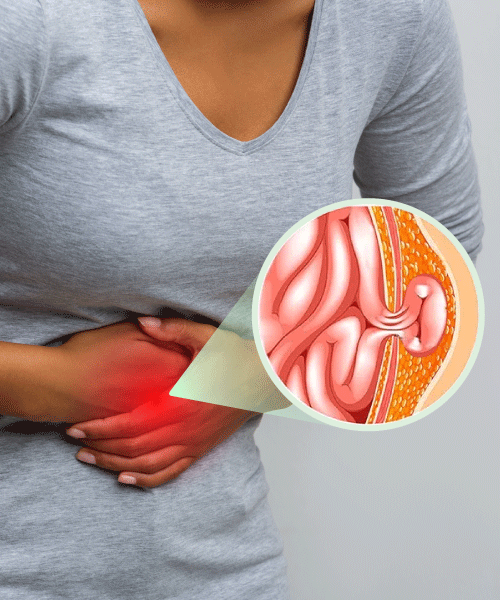Hernia

A hernia is when an organ or tissue bulges through a weak spot in the muscle or surrounding tissue. There are different types of hernias, which can be classified according to their causative mechanism and the area of the body where they occur. The most common type of hernia is an abdominal hernia, which occurs when there is a weakness or defect in the abdominal wall. This can allow abdominal contents to bulge through the opening. Another common type of hernia is a groin hernia, which occurs when there is a weakness in the inguinal canal. This canal is a passageway for nerves and blood vessels to the lower extremities. Hernias can also occur in other areas of the body, such as the diaphragm or around the navel. In some cases, hernias may be present at birth. However, they can also develop over time due to factors such as strain on the muscles and ligaments.
Signs and Symptoms
Symptoms of a hernia include a lump or bulge in the area where the hernia has occurred; pain or discomfort, especially when coughing, bending over, or lifting; and a burning, gurgling, or pulling sensation at the hernia site. If you think you may have a hernia, it is important to see your doctor so that they can diagnose the condition and recommend treatment. There may be a dull aching pain or a sensation of feeling full or bowel obstruction, especially if it is a hiatus hernia.
Diagnosis and tests
A hernia is commonly diagnosed on clinical examination as a bulge or a positive cough impulse and can be confirmed by an ultrasound. Additional investigations, including CT abdomen or MRI, can be of help in certain cases. The condition can become worse and, at times, leads to intestinal obstruction and gangrene of the intestine, where the patient ends up coming to an emergency and having surgery on an emergent basis to save the intestine and life.
Treatment
However, the surgery can generally be done as an elective case where general anesthesia is required. Via keyholes, the defect of the hernia is closed, placing additional support in the form of a mesh, which is body-friendly polypropylene material made of.
